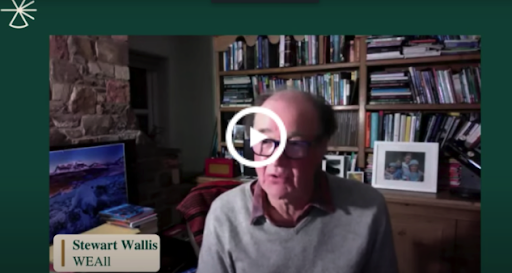by Stewart Wallis, Chair of the Wellbeing Economy Alliance
When my children ask me about which, if any, books have most influenced my thinking and the course of my life, I find it very easy to answer; ‘Small is Beautiful’ by E.F.Schumacher profoundly influenced me back in the 1970s when I was starting my working life and continues to do so to this day . This year marks the 50th anniversary of its publication and my now well-worn 49-year-old copy of the book goes with me everywhere.
It was therefore a great honour and pleasure to contribute to the first of the Schumacher Centre for a New Economics “Schumacher Conversations: Envisioning the Next 50 Years” alongside long-standing colleagues John Fullerton of Capital Institute, and Ruth Potts of Schumacher College, and moderated by Matt Stinchcomb, President of the Schumacher Center Board of Directors. The recording of “Reimagining Economics for a Thriving World” is now available in full on their website and YouTube channel.

Fritz Schumacher was a visionary well ahead of his time. He argued that ‘Western’ economic systems failed to distinguish between misery, sufficiency and surfeit and that economic growth would be good only to the point of sufficiency; limitless growth and consumption would be disastrous. Furthermore, he argued for an economy based squarely on renewable resources: an economy of permanence. In other words, he was calling for an economy for people and planet!
During the event I said that, despite the dire state of the world, I was more optimistic today than at any time in the last 50 years that Schumacher’s ideas are finally going to be implemented at scale. Why do I believe that? For two reasons: Firstly, there is a growing level of agreement about what the economic system needs to deliver and for whom. Secondly, many of the conditions for economic system change are now in place. What and How are becoming aligned!
There is now a remarkable and growing consensus across cultures and contexts about the type of economic system most people want. This shared vision for a better way of doing things can also be found across a surprising range of texts and backgrounds. It is embedded in the scripts of many religions. It is contained in worldviews of First Nations communities. It can be read in the scholarship of development experts and in research findings about what makes people flourish. This vision emerges in evidence from psychology about human needs and from neuroscience about what makes our brains react, and, perhaps most importantly, can be heard loud and clear in deliberative policy conversations with people all over the world about what really matters to them in their lives.
People want economic systems where:
- Everybody has enough to live in comfort, safety and happiness.
- There is a just distribution of income, wealth, time and power.
- All institutions and businesses serve the common good and create real value.
- Economies are locally rooted with people having both a say and a sense of control.
- And where the economy operates within local and planetary limits and regenerates and reveres the natural world and all life.
There are many different terms used to describe such an economy: Wellbeing Economy, Doughnutt Economy, Regenerative Economy, De-growth Economy, Buen Vivir, Ubuntu. While the details and descriptions of such systems differ, they all broadly share the same goals, principles and values. That’s why the Wellbeing Economy is often referred to as a picnic blanket, as it encompasses all of these movements.
The conditions for economic system change are also increasingly in place. Examination of successful system changes shows that, in addition to good research, great communications, effective campaigning and lobbying, and pioneering practical exemplars, four other strategies are critical:
- Leverage major crises
- Create new power bases
- Promote new compelling and positive narratives
- Support these with a coherent and accessible knowledge and evidence base
These strategies underpinned the two major economic shifts in the 20th century to Keynesianism and then to neoliberalism. The neoliberals’ strategy was based on the formation of an elite powerbase, backed by billions of dollars. Change now however, will need the formation of a broad-based movement backed by millions of people–cross sector, cross geography and simultaneously bottom up and top down.
WEAll, the Wellbeing Economy Alliance, was formed in 2018 to help catalyse such a movement. We have been amazed by the new willingness of groups across the world to collaborate to bring about economic system change. Already, in under 5 years, 350 global organisations have joined WEAll together with many thousands of individuals; some 20 nationally based hubs have been established involving many more individuals and organisations; and the idea of a Wellbeing Economy has really taken off with 6 Governments (New Zealand, Iceland, Finland, Scotland, Wales and Canada) committing to implementing such a system , many more interested, and the idea being discussed very widely including within the EU secretariat and by the UN Secretary General.
Furthermore WEAll is just one part of the growing worldwide movement for economic system change. This change will happen; the key question is how fast and how much damage can be averted. Until a couple of years ago I doubted change was possible at all. Now I am cautiously optimistic!
the discussion?
Let us know what
you would like
to write about!
